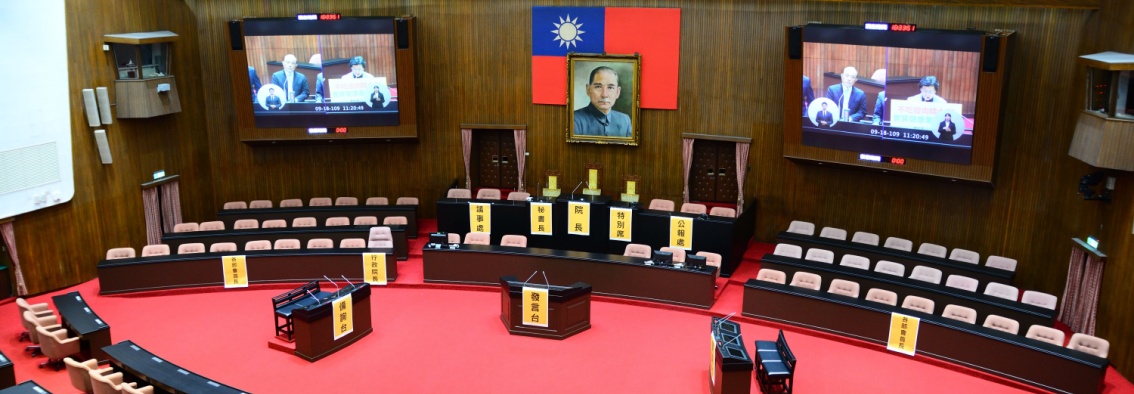Mention the Legislative Yuan (LY, 立法院) and even the staunchest fans of Taiwan will admit to feeling a bit of mortification over the antics that regularly play out between lawmakers. There appears to be no shortage of issues that could trigger chaos during a session: lawmakers have been known to brawl over everything from tax reviews and budgets, to legislative procedure and parliamentary reform. And even though one writer claimed that, in 2024, nearly all parliamentary clashes were started by the Democratic Progressive Party (DPP, 民進黨), there is no hard and fast rule regarding which political group starts brawls—indeed, conflicts are almost always instigated by whomever sits in the minority. When they were in the minority in 2020, Kuomintang (KMT, 國民黨) lawmakers famously resorted to pitching bags of pig organs at then Premier Su Tseng-chang (蘇貞昌) to protest a decision to import US pork from pigs that had been raised with the feed additive ractopamine, a leanness-enhancing drug.
That lawmakers resort to displays of violence, from shoving each other to throwing punches and launching projectiles, is not new—they’ve been doing it for decades. One lawmaker from Taiwan’s martial law era, the late Ju Gaw-jeng (朱高正)—one of the DPP’s founders—was even nicknamed “Rambo“ for his antics. During the 1980s, Ju regularly pitched over furniture and jumped on tables to make his feelings known on different issues in response to decisions made by a near-absolute KMT majority. In my days as a young reporter, I remember seeing lawmakers stashing oranges served up as part of late-night meal boxes (“bientang,” 便當), only to use them as projectiles hours later to bring the late session to a halt.

Image: Lawmakers in Taiwan’s Legislative Yuan scuffle over controversial draft legislation intended to increase the legislature’s oversight authority over the executive branch (May 17, 2024). Despite such dramatic public displays of conflict between parliamentary factions, there is often quieter cooperation between the parties conducted behind the scenes. (Image source: TaiwanPlus)
Hidden Cooperation
With such a legacy, it might be difficult to imagine Taiwan’s warring parties ever reaching across the aisle to support one another’s actions, bills, and resolutions. Yet, they have done so in the past, and have the ability to continue doing so today. Past sessions have seen lawmakers jointly pass resolutions condemning Chinese military exercises held around Taiwan in 2023. In 2022, the Legislative Yuan cleared amendments to its body of laws that govern the relationship between Taiwan and China, in a move the Mainland Affairs Council (大陸委員會) said was “passed thanks to the bipartisan support at the Legislative Yuan.” Those amendments sought to clarify rules involving travel to mainland China, and to raise penalties for Chinese persons and companies who illegally invest in Taiwan.
Cooperation has not ended there. In 2019, representatives from Taiwan’s four largest political parties signed off on a statement condemning the use of force against Hong Kong demonstrators during the former British colony’s extradition protests. The parties also got together to sign off and support the Tsai Ing-wen (蔡英文) government’s moves to join the World Health Assembly at the height of the COVID-19 pandemic. In 2019, KMT legislators Lin Wei-chou (林為洲), Jason Hsu (許毓仁), Chiang Wan-an (蔣萬安)—who currently serves as Taipei mayor—and Hsu Shu-hua (許淑華) even broke ranks with their party to vote in favor of same-sex marriage, a law rejected by the DPP’s more conservative members. Unfortunately, many of these events are under-reported and don’t get the same level of attention, if they are discussed at all.
Getting bipartisan support for bills and resolutions may be a tough sell, but there are issues that are still likely to win over lawmakers—especially those that sit in the center. Musician-turned-politician Freddy Lim (林昶佐), who served in parliament for 8 years (first as a member of the New Power Party from 2016-2019, and then as an independent until 2024), says two broad issues that have picked up bipartisan support during his time in office are tech development and social welfare—areas that also see considerable external support from both business and civil society. Lim says members of these non-governmental groups have connections with lawmakers from different parties. As a result, they are able to get things done through intense lobbying and negotiation. He says the groups approach lawmakers before they “split the work” of identifying who would be most receptive to specific legislation, regardless of party affiliation. This process can take anywhere from several weeks to years, depending on the issue. As an example, Lim recalls working towards—and getting bipartisan support for—granting same-sex couples the right to legally adopt children. The law came four years after same sex marriage was legalized; the motion was eventually passed on the LY floor with lawmakers raising no objections. Lim said that the legislation took about three years to negotiate. [1]
Moves to reach across the aisle aren’t dominated by lawmakers from any one party. Former Taiwan People Party (TPP, 民眾黨) lawmaker Cynthia Wu (吳欣盈) described an effort she undertook in an 2024 interview with this author for International Community Radio Taipei (ICRT). Wu shared that “in the LY, we have 113 members. My party only has five legislators, including myself. I managed to get 67 signatures in parliament. And this was in April, when I had just come back from maternity leave for two months, and I hadn’t been in parliament for a long time.” She vouched that the process works: “If you have a good idea, and you’re willing to share that and exchange ideas with others […] I got over half of [the] KMT, and over half of [the] DPP support for this, this initiative.” [2]
Reaching across the aisle can also be less cumbersome when many of these lawmakers know each other outside of work. Lim says parliamentarians elected by constituencies often have a chance to meet up at different events, from voter meet-and-greets to social functions. He says: “We always will meet other legislators [from neighboring constituencies]… it might be the chief in [one of] the temples or [a] priest from [a] church. It might be the [pastor] of [a] church. I [even] met legislators through my parents [or] grandparents.” That rapport comes in handy when less contentious bills are up for discussion. Lim says: “Sometimes I [would] just directly call the legislators that I can joke with and say, ‘At least don’t block my bill. It’s nothing controversial.’” [3]
But Lim, who eventually joined the DPP in November 2023, believes there is less congeniality between parties since the KMT took control of the Legislative Yuan in 2024. This is because the legislative agenda is less flexible under KMT caucus whip Fu Kun-chi (傅崐萁). As a result, brawls and violence have become negotiating tactics. Still, both sides have been known to get together to support common issues that matter to Taiwan. For instance, a bipartisan delegation made up of three KMT, one TPP, and three DPP representatives travelled to the US for the inauguration of US President Donald Trump in a show of bipartisanship.
When Brawling has Function
So is all the fighting performative? In some cases it can be, because public brawling is one way to show the electorate that their chosen representative is willing to resort to fisticuffs to advance their agenda. When a party is only represented by a handful of members, “then you might need that performative [element] to show your supporters that you have [made] some efforts,” Lim says. Research by Nathan Batto and Emily Beaulieu and published in Making Punches Count: The Individual Logic of Legislative Brawls supports Lim’s observations: the authors posit that fights are started by those who have already weighed up the pros and cons of their actions. [4]
But in other cases, the conflicts are real. Lim also pointed out that disrupting a proceeding can be the only way to buy time for opposing sides to sit down and negotiate their way to a solution that has the potential to benefit all. Nonetheless, flexibility depends on who is in charge and what a political party wants to achieve. According to Lim, “bipartisan negotiation is very difficult right now, [because] the KMT has a very strong direction, and it’s very difficult to change the whole agenda set by the KMT.” Lim added that “If you can at least win a battle a day… then you buy time to negotiate.” This stems from the fact that once a session has been suspended, it can take weeks before the issue re-appears for discussion. [5]
Still, there is no denying the upside of having members of the Legislative Yuan working together to get things done. During a 2022 interview for ICRT, former KMT legislator Jason Hsu explained that during his time in office, he was motivated by the belief that “If we [want] to move society forward […] the two parties must work together. And sometimes there are issues that are not so much about ideology, it’s about the future, and also about social progressiveness. And I think we could work together in passing laws that are direct [and] can set examples for the future generations.”
There is no denying that resorting to fistfights may be a relatively easy task for lawmakers, just as covering squabbles and fistfights can be an exciting and straightforward exercise for many journalists. In an age where media outlets both in Taiwan and abroad fight for attention, parliamentary violence sells. It is also easier for journalists to cover the Legislative Yuan by reporting on fighting than it is to explain bills in greater detail, or to cover deliberations on the precise placement of words, phrases, and punctuation marks. (I should know, as I was guilty of that myself as a young reporter.) Unfortunately, focusing on disruptive parliamentary brawls can result in a failure to give the Legislative Yuan the type of reporting it is due. It can also keep lawmakers from getting the attention they deserve, particularly when performing the duties they were actually elected to carry out.
The main point: The public conflicts between members of the Legislative Yuan, which sometimes include physical fights on the floor of the legislature, attract great public attention and highlight the partisan frictions between the parties. However, behind the scenes, legislators have often engaged in more constructive and cooperative efforts to advance legislation beneficial to Taiwan society.
[1] Author’s interview with Freddy Lim, March 6, 2025.
[2] Author’s interview with Cynthia Wu, January 25, 2024.
[3] Author’s interview with Freddy Lim, March 6, 2025.
[4] Nathan F. Batto and Emily Beaulieu, Making Punches Count: The Individual Logic of Legislative Brawls (Oxford University Press, May 2024).
[5] Author’s interview with Freddy Lim, March 6, 2025.




